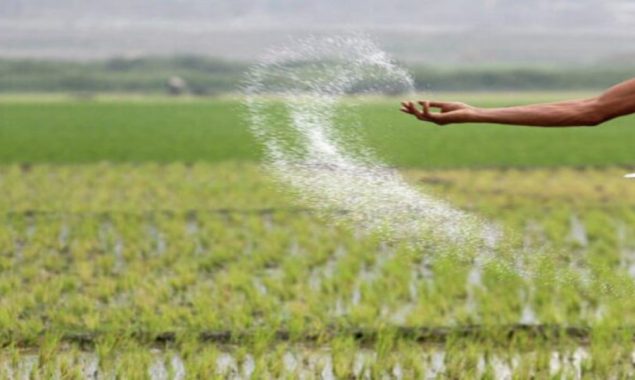China tightens rules on overseas listings in Didi fallout
BEIJING: Beijing has tightened the rules on overseas listings by Chinese firms in...

Image: File
KARACHI: The farmers are paying an extra price of around Rs600/bag of urea against the government fixed price of Rs1,800, a research report issued by the AKD Securities revealed.
Currently, urea is being sold in the domestic market at an increased price of around Rs2,400/bag.
The disparity in the domestic and international prices of Rs7,700/urea bag has been the primary reason affecting the retail supplies of the commodity, the report said.
As the Rabi sowing season is in full swing, Sindh and Punjab are facing fertiliser shortage, despite 11.6 per cent increase in the urea off-take in the calendar year to-date.
The international prices that have touched Rs9,500/bag (premium of 427 per cent) against the domestic price of Rs1,800/bag can be attributed as the main reason for the urea shortfall.
The report, on the basis of its channel checks, said that the farmers have been forced to pay a premium of 30 per cent to 35 per cent over the official prices.
“The supply side concerns come at a time when wheat sowing is in full swing, posing risks to the overall acreage of the crop, which remained stagnant around 1.15 tonnes/acre over the last many years, and to the production target set for the current season of 30 million tonnes.”
Despite the supply side concerns, limited risks are expected owing to better farm economics, including the bumper crops during the last season, favourable pricing trends and increase in the support price.
The support price of the commodity has been revised up to Rs2,200/bag in Sindh and Rs1,950/bag by the centre.
“Pakistan reported a bumper wheat crop of 27.3 million tonnes last year and it has also imported another 3.6 million tonnes to build buffers to manage end-user prices. Hence, we do not see price pressures in the immediate run; however, realisation of risks to wheat production target may hit the prices in the medium run,” the report noted.
The huge disparity in the urea prices in the local and international markets has opened a window for unwanted trading activities by the middleman, which is resulting in availability of urea in the local market and may dent the yield/acre of wheat during the Rabi season.
Wheat, the chief Rabi crop of the country, is currently in the sowing stages. The crop requires three bags of urea/acre, translating into an annual demand of around 3.4 million tonnes for wheat.
However, the unavailability of fertilisers during the season may dent the overall production of the commodity where the average yield over the last five years remained stagnant around 1.15 tonnes/acre.
The annual wheat production during the last many years has averaged around 2.5 million tonnes, while the same clocked-in at 2.7 million tonnes last year, while the government imported another 3.6 million tonnes to manage the short-term demand and supply gaps, according to the report.
There is ample supply of the commodity in hand but the shortfall of this year’s production may result in prices going north next season. To this end, every 5 per cent increase in wheat prices results in an inflationary impact of 23bps on a month-on-month basis.
Catch all the Business News, Breaking News Event and Latest News Updates on The BOL News
Download The BOL News App to get the Daily News Update & Follow us on Google News.